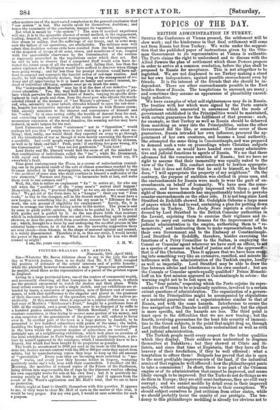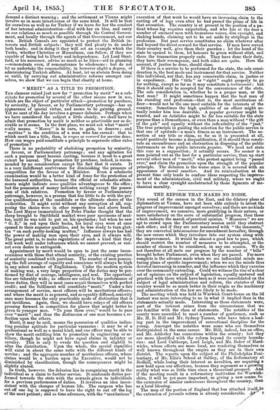TOPICS OF THE DAY.
BRITISH ADMINISTRATION IN TURKEY.
SHOULD the Conference at Vienna proceed, the settlement will be slow work; and the hinderanee in that final settlement will come not from Russia but from Turkey. We write under the supposi- tion that the published paper of instructions given by the Otto- man Government to its representative at Vienna is authentic. The Porte claims the right to understand and to discuss with the Allied Powers the plan of settlement which those Powers propose in order to arrive at a common resolution, before the plan shall be proposed to Russia for acceptance. This is not altogether to be regretted. We are not displeased to see Turkey making a stand for her own independence, against possible encroachment even by friends. It is the interest of the friends that she should be in- dependent. There are other encroachments possible in the East besides those of Russia. The temptations to encroach are many ; and sometimes they assume an appearance of plausibility exceed- ingly seductive. We have examples of what self-righteousness may do in Russia. The treaties with her which were signed by the Porte contain stipulations which amounted to assurances that the mode of government established in the Principalities would be maintained, with certain guarantees for the fulfilment of that promise : such, for example, as that Turkey as well as Russia should be debarred from marching an army into the Principalities, unless the other Government did the like, or consented. Under cover of these guarantees, Russia intruded her own influence, procured the ap- pointment of her own creatures, and became a local authority. She attempted the same thing in Constantinople, and was prepared to demand such a veto on proceedings where Christian subjects were in question as would have handed over many administra- tive and judicial functions to agents of Russia. We see that these advances fed the voracious ambition of Russia; but we have no right to assume that their immorality was equally naked to the view of the Czar. His conduct amounted to lawless appropria- tion; but it does not follow that he said to himself, as the thief does, " I will appropriate the property of my neighbour." On the contrary, the purpose of ambition was clothed in pious uses, and the encroachments for Russia were made to wear the garb of en- croachments on behalf of humanity. We have seen the conse- quences' and have been deeply impressed with them ; and the sight of those encroachments has unquestionably tended to provoke counter-encroachments on the other side. It is not long since Lord Stratford de Redeliffe showed Mr. Godolphin Osborne a large mass of papers which he had to read, containing a plan for putting down extortion in Turkey. The Daily News reprints a circular ad- dressed by Lord Stratford to the British Consular authorities in the Levant, enjoining them to exercise their vigilance and in- fluence to carry out certain firmans for the improvement of the judicial administration in the empire, authorizing them to " re- monstrate," and instructing them to make representations both to their own Government and to the Embassy at Constantinople. Lord Stratford de Redoliffe, therefore, besides exercising the functions of a Privy Councillor to the Sultan, is employing the Consul or Consular agent wherever we have such an officer, to act as a species of assessor on behalf of justice and of the oppressed%--- that is of the Christian. Thus it appears that we have been creep- ing into something very like an extensive, ramified, and minute in- terference with the administration of the Turkish empire, locally as well as imperially. Lord Stratford may be able to draw the line between advice and interference in his own conduct ; but are the Consuls or Consular agents equally qualified P Prince Menschi- koff on his first mission appeared in Constantinople to advise : the warning ought not to be lost upon us.
The "four points," respecting which the Porte enjoins its repre- sentative at Vienna to be so jealously cautious, involved to a certain
extent in of administration. The organization of a govern- ment n the Principalities might be accompanied by stipulations of a material guarantee and a superintendence similar to that of Russia, and with the same hazards. Interference to secure the free navigation of the Danube is still more probable; but the object is more specific, and the hazards are less. The third point is least open to the difficulties that we are now tracing ; but the fourth, involving guarantees for the bone. fide security of immuni- ties to the Greek subjects, is the point that might drag us, through Lord Stratford and his Consuls, into ecclesiastical as well as civil and judicial administration. The Turkish people merit every respect for the better qualities which they displLdaTheir soldiers were understood to disgrace themselves at B va ; but they showed at Citate and Si- listria, and since that time at Eupatoria, that they have all the bravery of their forefathers, if they be well officered : what a temptation to officer them ! Bulgaria has proved that she is open to the most profitable improvements of the land, if the industrial armies of that regionhe well officered : how the philanthropist pants to take a commission ! In short, there is no part of the Ottoman empire or of its administration that cannot be improved, and seems likely enough to be improved. But the Turks do not do things as we do them in Europe ; they are still semi-barbarous, they are still very. corrupt ; and we cannot meddle by detail even in their improved methods, without entangling ourselves in their corruptions. We should subject ourselves to just criticism from other states, while we should probably incur the enmity of our proteges. The ten- dency to this philanthropic meddling is already too obvious not to
demand a distinct warning ; and the settlement at Vienna might involve us in more interference of the same kind. It will be best for ourselves as well as for Turkey if we leave for her the conduct of her internal administration—deal with her en bloc, and carry on our relations as much as possible through the Central Govern- ment, and locally through the agents of that Government, not our own. British Consuls are appointed to protect the British in- terests and British subjects : they will find plenty to do under both heads; and in doing it they will set an example which the Turks, whether Christian or Mussulman, can follow, if they are capable of being led to liberty and independence. Let Lord Strat- ford, or his successor, advise as much as he likes—aid in planning —remonstrate even, if remonstrance be wholesome : but do not let us undertake the responsibility, in however slight a degree, of administering Turkish affairs. At least, let us abstain from doing so until, by carrying out administrative reforms amongst our- selves, we show that we can begin that charity at home.



























 Previous page
Previous page